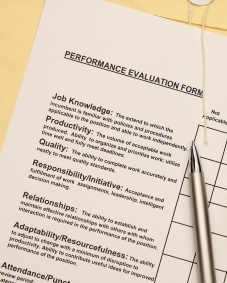 Most of us are familiar with the performance review, a typically annual process in which you get together with your boss to review your accomplishments and shortcomings from the past year, and set goals for the coming year. In many cases, the review ends at that climactic moment when the boss tells you (cue the trumpets) your raise — or lack of one.
Most of us are familiar with the performance review, a typically annual process in which you get together with your boss to review your accomplishments and shortcomings from the past year, and set goals for the coming year. In many cases, the review ends at that climactic moment when the boss tells you (cue the trumpets) your raise — or lack of one.
If the review process is done right, it can provide you with insight into your strengths and weaknesses, other roles you could play, and whether you think you should stay with the employer or launch a job search.
Perhaps just as important as the boss's approval and a boost in your paycheck, the performance review can also be an effective career management tool. That's increasingly critical in today's insecure employment atmosphere, which is forcing many to change jobs more often to achieve their career goals.
For many, that annual sit-down with the boss will come near the end of the year, before companies close the financial books on 2009 and open new ones for 2010. But no matter when your review occurs, here are seven questions you should ask yourself before you meet with your boss:
- How did I contribute to my employer's success this year?
- Did I help them save money? Make money? Make a process easier?
- Did I help someone do their job better by sharing my help and expertise?
- Did I take on new challenges that were critical for the company?
- Is what I'm doing right now making me more valuable to the company?
- Is this a job I want to keep for a while? Or can I use it to take on something more challenging, either with this company or with another?
- Do I feel a sense of accomplishment most days?
You can take a proactive approach to answering these questions by documenting your accomplishments as they happen in a career journal or brag sheet. This can come in handy if your employer's performance-review process requires you to fill out a self-evaluation and submit it to your boss beforehand. It's also a great resource you can refer to when it's time to update your resume.
Use your boss's version of the review to validate your own assessment of how you're doing, then supplement it with the good things your boss cites that you may have overlooked. For instance, if you mentored a new colleague and didn't know until your review that it saved your boss time that would have been spent helping that person, you have a new entry for your journal or brag sheet.
That also comes in handy as an addition to your resume when you feel it's time to move on to something else. The bottom line is to treat the performance review as both a report card on the past year and a career management guide for the year ahead and beyond.
RELATED LINKS
5 Factors That Can Hurt Your Performance Reviews
Career Journaling for the Future
Ready To Jump Start Your Job Search?
